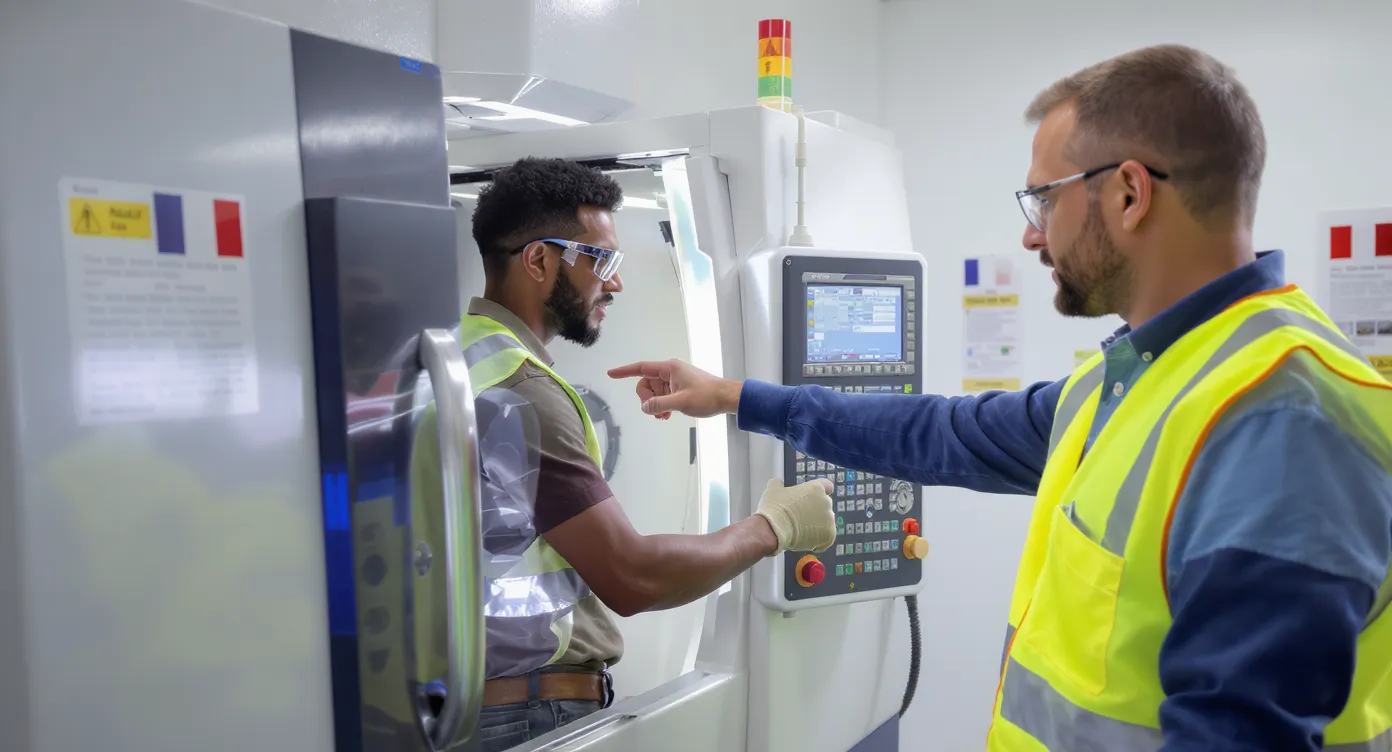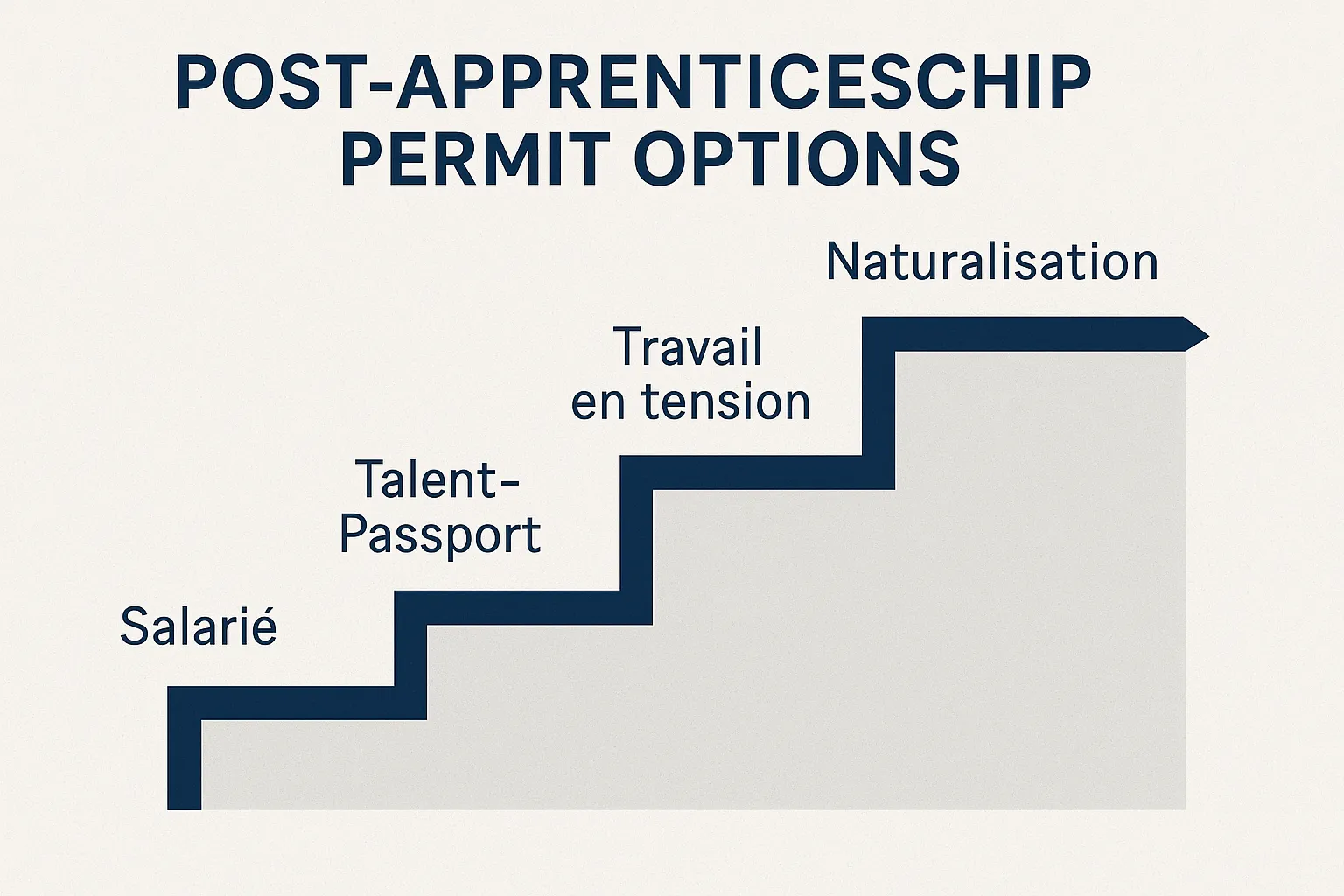Unlocking Apprenticeship Contracts for Non-EU Youth: Permit Essentials

Signing an apprenticeship contract in France is no longer reserved for EU nationals. Since the 2021 reform of the Code du travail and the 2024 Immigration & Integration Act, non-EU youth aged 16-30 can leverage a dedicated residence-permit track that recognises contrats d’apprentissage as a bridge to legal employment and long-term settlement. The catch? You must secure the right permit before your first day on the job—or risk turning a career opportunity into an immigration headache.
1. Why Apprenticeships Matter for Non-EU Candidates
- France created 837 000 new apprenticeship contracts in 2024 (Ministry of Labour, March 2025), and employers in shortage sectors—IT, hospitality, construction—are aggressively recruiting international talent.
- Apprentices are paid (27 %–100 % of the SMIC depending on age/year) while earning an officially recognised diploma from a Centre de formation d’apprentis (CFA).
- Completing a French apprenticeship can unlock easier upgrades to Passeport Talent or standard salarié permits, strengthen naturalisation files, and offer exemption from the labour-market test under the 2025 quota system.
For non-EU youth, however, the key is understanding which residence permit to request before the contract is registered with DREETS.
2. Residence-Permit Options at a Glance
| Permit label (CESEDA) | Typical holder | Max duration | Work limit | Age cap |
|---|---|---|---|---|
| Temporary residence permit – “Apprentice” (L.422-1) | Non-EU candidates recruited specifically for an apprenticeship | Length of contract (max 3 yrs) | No weekly cap | 16-30 |
| Student permit with apprenticeship add-on | Existing non-EU students switching study track | Until end of studies (renewable) | 50 % of annual hours OR full-time if apprenticeship contract registered | None specified by CESEDA but schools often cap at 29 |
| Talent Passport – Young Graduate (L.421-16) | Master’s graduates hired on apprenticeship-like “Pro” contracts | Up to 4 yrs | None | 30 |
Key takeaway: If you are outside France, the standalone “Apprentice” permit is the fastest route. If you are already studying in France, you can generally keep your student card but must upload the signed apprenticeship contract to ANEF before starting.”

3. Eligibility Checklist
- Age: 16 – 30 on the signing date (strict for the “Apprentice” permit).
- Training centre: Your CFA or university must appear on the official RNCP list and hold an apprenticeship accreditation.
- Diploma objective: CAP, BTS, Licence Pro, Master, engineering degree or higher.
- Employer commitment: A French-law entity willing to pay apprenticeship wages and register the contract via CERFA n° 10103*09 on the Portail de l’Alternance.
- Minimum salary: 27 %–43 % of SMIC in year 1, rising in later years.
- Health coverage: Registration with CPAM compulsory (see our guide on CPAM registration).
- Language: No legal French-level requirement, but most CFAs demand A2-B1.
Failure to meet any one of these criteria will lead DREETS to refuse contract validation, blocking your prefecture filing.
4. Step-by-Step Permit Procedure (Outside France)
- Secure a pre-signed contract. Both employer and apprentice sign the CERFA; the CFA countersigns.
- DREETS validation within five business days (Portail de l’Alternance issues a QR-coded PDF).
- File a long-stay “Apprentice” visa (VLS-TS Apprenti) on France-Visas. Upload: passport, contract, acceptance letter, proof of lodging, and finances (three months of bank statements showing at least €615/month excluding salary).
- Biometrics at the consulate (fee €99).
- Entry to France + OFII/ANEF validation within three months of arrival (online €225 tax stamp).
- Pick up residence card at the prefecture when notified (average 45–60 days).
Already in France on a Student Permit?
- Amend your ANEF account: choose “I have an apprenticeship contract” in the “Modify my situation” menu.
- Upload the validated CERFA and new school certificate.
- Pay a €49 platform fee only if a new physical card is issued.
5. Employer Obligations—And Risks if They Slip
French companies hiring non-EU apprentices must:
- Verify the residence document via “Contrôle Travail” e-portal (mandatory since July 2025).
- Register the contract with URSSAF and occupational-medicine bodies.
- Maintain wage levels and training hours set in the CERFA.
- Notify the prefecture of early termination within 48 hours.
Non-compliance can trigger the hefty sanctions detailed in our piece on Employer Penalties for Undocumented Workers. For apprentices, fines reach €4 000 per illegal month plus back wages and a possible five-year ban on hosting apprentices.
6. Maintaining & Renewing the Permit
- Attendance monitoring: CFAs send monthly reports to the prefecture. Below-75 % attendance = warning; repeat = permit withdrawal.
- Exam attempts: missing the diploma exam without a valid reason bars renewal.
- Contract amendments (salary increase, workplace move) must be filed on the Portail de l’Alternance within 15 days and uploaded to ANEF.
Renewal is possible for a new contract only if it leads to a higher diploma level (e.g., from BTS to licence professionnelle).
7. After the Apprenticeship: Pathways to Stay Longer
- Full-time “Salarié” permit: your host company may skip the labour-market test if the job matches your diploma.
- Passeport Talent – Recent Graduate: minimum gross salary €41 933 (1.5× SMIC).
- Work-regularisation (L.435-1): undocumented ex-apprentices can leverage 12-month pay-slip evidence—see our 8 Pay-Slip Checklist.
- 10-year resident card after five consecutive years of legal stay (including apprentice years) if you meet integration and resource criteria.
- French citizenship: apprenticeship years count toward the standard 5-year continuous residence rule, provided tax filings and employment were compliant.

8. Common Pitfalls—and How to Dodge Them
- Late visa filing: consular slots evaporate between June and August; aim to file 12 weeks before the school year.
- Age limit miscalculation: turning 31 before contract signature voids eligibility—even if DREETS already approved.
- Unaccredited training centre: cross-check the CFA on data.gouv.fr/CFAlist or risk a prefecture refusal.
- Duplicate statuses: holding both an “Apprentice” card and a student card is impossible; you must cancel one through ANEF.
- Salary below legal grid: prefectures compare your payslips to the SMIC-based table; underpayment leads to withdrawal and potential OQTF.
9. How ImmiFrance Can Help You Secure the Right Permit
Navigating three administrations—DREETS, France-Visas and your prefecture—while syncing employer and school deadlines is tricky. ImmiFrance offers:
- Contract feasibility checks within 24 hours (training centre accreditation, salary grid, age compliance).
- Prefecture-specific document kits and ANEF filing support.
- Real-time case tracking so you and your employer know exactly where the file sits.
- Lawyer referrals if a refusal, OQTF, or salary dispute arises.
Whether you are a future apprentice abroad or a current student pivoting to alternance, book a free 15-minute eligibility call on our website to avoid costly mistakes and start your French career on solid legal ground.
